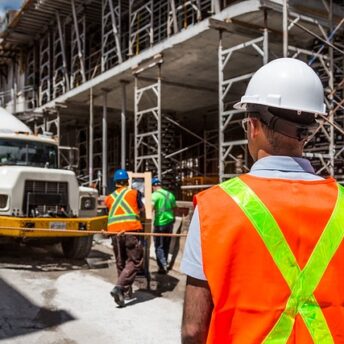In the realm of construction disputes, the process of adjudication plays a pivotal role in resolving conflicts efficiently and effectively. Adjudication is a form of alternative dispute resolution (ADR) specifically designed for the construction industry, providing parties with a swift and cost-effective means of resolving disputes without resorting to lengthy and expensive litigation. One particular aspect of adjudication that warrants attention is “Rule Adjudication.” At Blackstone Solicitors, we provide legal guidance to clients across England and Wales, assisting them in navigating the complexities of construction disputes, including rule adjudication. In this article, What Is Rule Adjudication, we will delve deeper into the subject.
Please click here to find out more about our Construction Law services
Free Initial Telephone Discussion
For a free initial discussion with a member of our New Enquiries Team, get in touch with us today. We are experienced in dealing with all the legal aspects of adjudication in construction and once instructed, we will review your situation and discuss the options open to you in a clear and approachable manner. Early expert legal assistance can help ensure you are on the best possible footing from the start and also avoid the stress of dealing with these issues on your own. Simply call us on 0345 901 0445 or click here to make a free enquiry and a member of the team will get back to you.
Understanding Rule Adjudication
Rule adjudication refers to the process of resolving construction disputes in accordance with the rules and procedures established by relevant adjudicatory bodies or institutions. These bodies, often referred to as adjudication panels or tribunals, provide a framework for conducting adjudication proceedings, including the appointment of adjudicators, the exchange of submissions and evidence, the conduct of hearings, and the issuance of adjudication decisions.
In the UK, rule adjudication is governed by the Housing Grants, Construction and Regeneration Act 1996 (the Construction Act) and the Scheme for Construction Contracts (England and Wales) Regulations 1998 (the Scheme). These legislative instruments set out the statutory framework for adjudication in construction disputes and establish the rules and procedures to be followed by adjudicators and parties involved in adjudication proceedings.
Key Features of Rule Adjudication
Rule adjudication in construction disputes is characterised by several key features that distinguish it from other forms of dispute resolution:
- Speed and Efficiency: Rule adjudication is designed to be a swift and expedited process, with strict timeframes for the exchange of submissions, the conduct of hearings, and the issuance of adjudication decisions. Adjudicators are required to render decisions promptly, usually within 28 days from the date of referral.
- Informality: Rule adjudication proceedings are relatively informal compared to traditional litigation or arbitration. Parties have the opportunity to present their case orally or in writing, without the need for formal pleadings or extensive legal arguments. This informal approach allows for a more expeditious resolution of disputes.
- Adjudicator’s Role: The adjudicator plays a central role in rule adjudication proceedings, acting as an impartial decision-maker tasked with resolving the dispute based on the evidence and submissions presented by the parties. Adjudicators are typically experts in construction law and industry practice, with the necessary skills and experience to adjudicate complex construction disputes effectively.
- Enforceability of Decisions: Adjudication decisions issued by adjudicators are legally binding and enforceable, subject to any subsequent challenge or review by the courts or arbitration tribunal. Parties are generally expected to comply with adjudication decisions pending final resolution of the dispute through litigation or arbitration.
Benefits of Rule Adjudication
Rule adjudication offers several benefits to parties involved in construction disputes:
- Speedy Resolution: Rule adjudication provides parties with a rapid and efficient means of resolving disputes, allowing them to avoid protracted litigation or arbitration proceedings and minimise project delays and disruptions.
- Cost-Effectiveness: Rule adjudication is generally less costly than litigation or arbitration, as it involves fewer procedural formalities and legal expenses. Parties can save time and money by opting for adjudication as a means of dispute resolution.
- Expert Decision-Making: Adjudicators are typically experts in construction law and industry practice, with the requisite knowledge and expertise to adjudicate complex construction disputes effectively. Their impartial and informed decision-making enhances the credibility and fairness of the adjudication process.
- Preservation of Relationships: Rule adjudication can help preserve working relationships between parties involved in construction projects by providing a mechanism for resolving disputes quickly and amicably. This can be particularly beneficial in maintaining project momentum and collaboration.
Conclusion
In conclusion, rule adjudication is a valuable mechanism for resolving construction disputes swiftly and effectively. Governed by the rules and procedures established by relevant adjudicatory bodies or institutions, rule adjudication offers parties a speedy, cost-effective, and expert-driven means of resolving disputes without resorting to lengthy and costly litigation or arbitration proceedings.
At Blackstone Solicitors, we provide legal guidance and support to clients across England and Wales, assisting them in navigating construction disputes and rule adjudication proceedings. With our expertise and dedication, we help clients achieve successful outcomes in their construction projects by resolving disputes in a timely and efficient manner.
Top of Form
How we can help
We have a proven track-record of helping clients deal with the legal implications of adjudication in a construction project. We will guide you through all the necessary legal due diligence in a comprehensive and timely manner and support and advise you with all the negotiations. We firmly believe that with the right solicitors by your side, the entire process will seem more manageable and far less daunting.
Please click here to find out more about our construction legal services.
Deciding when (or whether) to incorporate, what kind of ownership How to Contact our Construction Solicitors
It is important for you to be well informed about the issues and obstacles you are facing. However, expert legal support is crucial in terms of saving you money and ensuring you achieve a positive outcome.
To speak to our Construction solicitors today, simply call us on 0345 901 0445 , or allow a member of the team to get back to you by filling in our online contact form. We are well known across the country and can assist wherever you are based. We also have offices based in Cheshire and London.





